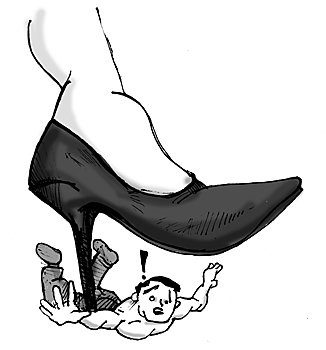
Ilustration by Holly Randall
|
|
By Damion LeeNatali
Arizona Daily Wildcat
Friday, April 15, 2005
Print this
A man walking down a beach stumbles across a lamp and a genie magically appears to grant him three wishes. The man requests he be made smart, wise and loved by everyone. The genie nods and turns him into a woman.
While those of us with a Y chromosome might bristle upon hearing such humor, the fact of the matter is that we're quickly falling behind our female counterparts. It's a trend that seems to have escaped the notice of many men, but women in higher education are consistently outperforming them in the areas of academics and leadership.
The statistical evidence, while seemingly little known to the average student, is staggering. While men comprise 51 percent of the college-age population in the United States, women account for 54 percent of full-time college students, earn more than 56 percent of the bachelor's degrees every year, and graduate in four years or less at a rate 10 percent higher than that of men.
Not surprisingly, the UA is no exception to the rule. Women account for nearly two-thirds of the Honors College, and perhaps more significantly, they're beginning to dominate areas that are traditionally thought to be distinctly male territory. The UA's female students outnumber males in various graduate schools and the schools of law, medicine and pharmacy.
 |
|
Damion LeeNatali
Columnist
|
|
|
Granted, some male strongholds still remain (men still have commanding leads in the Eller College of Management and the College of Engineering and Mines), but it's worth mentioning that women have made a strong showing in an area that is probably more significant than sheer enrollment numbers - leadership.
It's probably no secret among students who are involved in extracurricular activities that women are among the most active participants. Indeed, in an audit of the 50 largest clubs on campus, this columnist found that nearly 60 percent are led by these so-called "alphettes" (the female version of alpha males). But while the statistics paint a fairly obvious picture, the reasons for the disparity between the sexes are far less apparent.
Some suggest women are simply more driven. In a study conducted by Cooperative Institutional Research Program, researchers found that female high school seniors spent more time studying or doing homework, talking with teachers and doing volunteer work. The males in the study were reported to have spent the bulk of their time watching television, partying and exercising.
Certainly, such findings present males in a most unflattering light, but others take a more culture-centered tack. Michelle Espino, a graduate assistant for multicultural advocacy and programs in the UA's Center for Student Involvement and Leadership, argues that some males operate on a number of false assumptions that are grounded in a society heretofore controlled by men.
"There's an assumption that men are born leaders. There's an assumption that they don't need (leadership) opportunities. Women seek out opportunities because they want to continue to develop themselves. Men might feel that they already know all there is to know about leadership," she said.
What's more, the assumption that being male amounts to proven leadership ability is short-sighted at best, especially given the fact that contemporary business and leadership models are moving away from top-down hierarchical management in favor of a bottom-up approach that emphasizes interpersonal relationships and strong lines of communication.
Thus, as a matter of practicality, Espino notes that men who choose not to develop themselves are reducing their ability to compete in a tight job market that requires such traits of its employees saying, "Leadership is changing - it's not hierarchical anymore. If men don't have the skills to build relationships or to be willing to be challenged, they're going to lose out on the new trends (in leadership)."
So, yes, the success of ambitious alphettes is laudable, but achievement for both sexes should hardly be mutually exclusive. A social system in which only half of the populace shows a dedication to
scholarship and leadership is unsustainable, and while it has yet to reach that point, it is a development that is best stymied in its earliest stages.
Of course, convincing the typical male to abandon the television, the parties or the weight room might prove easier said than done. Even so, he would do well to remember that if he deems academics or leadership roles to be useless, or even girly, he should ready himself for a lifetime of female bosses.
Damion LeeNatali is a political science and history sophomore. He can be reached at letters@wildcat.arizona.edu.
